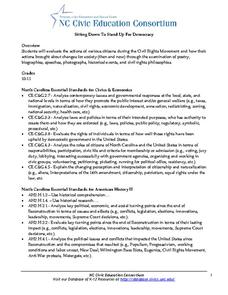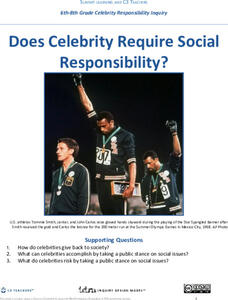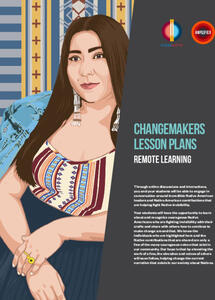Carolina K-12
On the Road to Revolution: Creating a Living Timeline
Divided into nine topic groups, from the Proclamation of 1763 to the Battles of Lexington and Concord, your young historians research significant events on the road to the American Revolution, then create a two- to three-minute sketch...
University of North Carolina
Sitting Down To Stand Up For Democracy
Boycotts and bus rides, sit-ins and speeches. The focus of this amazing resource is on those people who were willing to put themselves at risk to take a stand for their belief in equal rights for all. A must-have for your curriculum...
C3 Teachers
Celebrity Social Responsibility: Does Celebrity Require Social Responsibility?
Is much required of those to whom much is given? That's the central question asked of middle schoolers in this lesson. Scholars consider the actions of Tommie Smith and John Carlos, Colin Kaepernick, Lady Gaga, and others who have taken...
Curated OER
Changemakers Lesson Plans
Teens and tweens are invited to become changemakers in a five-lesson unit, asking them to investigate and share what they have learned about exemplary, contemporary Native Americans. They gather facts about their research subject, record...
Anti-Defamation League
8 Ideas for Teaching National Hispanic Heritage Month
Here are eight ideas to celebrate National Hispanic Month! Scholars have the opportunity to read and discuss literature, include people and events in history, examine art, watch and discuss films, listen to and dance to music, explore...
Vaquera Films
Wonder Women - The Untold Story of American Superheroines: Middle School Curriculum Guide
Women in power are the focus of a three-module unit that employs comic books to bring home the importance of equality and proficient media literacy skills. In module one, scholars examine gender roles in media—boosting media literacy and...
Pulitzer Center
The Paradise Papers: A Lesson in Investigative Journalism
The Paradise Papers, a year-long research project from the International Consortium of Investigative Journalism (ICIJ) exposed how political leaders, business people, and wealthy individuals used offshore entities to avoid taxes and hide...
New York City Department of Education
Grade 8 Science: Genetic Modification of Organisms
Genetic modification is a hot topic in the science and political world. A complete unit gives learners an opportunity to research genetic modification, play an interactive genetic engineering simulation, and interact with the information...
Stanford University
Observing Human Rights Day
How much intervention is appropriate for America to take in cases of human rights violations? Class members ponder a question that has lingered since the birth of America with a series of primary sources that reflect the degree to which...
Annenberg Foundation
The Search for Identity
Discover how writers express identity in their writing. Learners explore how issues of identity surface in the literature of minority writers. Scholars watch a video, read and discuss biographies, conduct research, engage in creative...
Annenberg Foundation
Becoming Visible
The television and interstate highways both came of age in 1950s America. Scholars use film, text, and discussion to explore how these and other cultural icons shaped the literature of the time. Pupils also create a family history...
Annenberg Foundation
Rhythms in Poetry
Rhyme, rhythm, free verse, imagery: Do these words describe poetry, or jazz music? The answer is both! A resource explores these similarities as scholars watch a video, engage in discussion, read author biographies, write poetry and...
Digital Public Library of America
Teaching Guide: Exploring Little Women
Louisa May Alcott's Little Women is a literary masterpiece as well as a timestamp of the formative mid-nineteenth century in America. Using a primary source set of photographs, letters, and portraits, readers discuss the ways...
California Department of Education
Evaluating Web Sites
If it's on the Internet, it must be true—right? How can someone tell if a website contains less-than-truthful information? Savvy surfers evaluate sources in the fifth of a six-part college and career readiness instructional activity...
Smithsonian Institution
The Price of Freedom: Americans at War
An interactive resource covers all of the United States' most prominent and influential historic wars including the Vietnam War, the Cold War, the War of 1812, and the Korean War. Learners observe cause and effect as well as how violence...
Constitutional Rights Foundation
If Men Were Angels: Teaching the Constitution With the Federalist Papers
Much like the methods of group work, the writers of the Federalist Papers worked together to advocate for their viewpoints against the anti-federalists. The resource enables learners to break into small groups and conduct research before...
Smithsonian Institution
Students’ Response to 9/11—A Documentary Report
Young historians research the devastating attacks of 9/11 and use that information to script their own documentaries. The follow-up activity includes recording the documentary and conducting classmate interviews,
Smithsonian Institution
The Soldier’s Experience—Vietnam versus World War I
The Vietnam War and World War I were two very important—and different—wars. To understand the differences, and similarities, class members watch videos, examine primary source documents, and then create a newscast that examines the...
Smithsonian Institution
Changing Gender Roles on the Home Front
Many historians discuss how gender roles changed because of World War II, but how did this come to be? An informative resource challenges scholars to do some digging and research the information for themselves. They research how...
Vietnam Veterans Memorial Fund
Hometown Heroes
Transform studying about veterans in a textbook to personal interviews with veterans in the community. Four varying lesson plans make up an entire unit or individualized learning based on your class's needs. Exercises include researching...
Montana State University
Sea Floor to Summit
Who knew that mountain formation could be so entertaining? Leanr how mountains form with a resource on Mount Everest. Activities to guide learning include a simulation, project, videos, coloring activities, and worksheets.
Montana State University
What's the Weather?
How many jackets do you need to stay warm and climb Mount Everest? An informatie resource covers the topic of Mount Everest, the resource helps young scientists discover the difference between climate and weather. Activities include...
PBS
Women's History: Parading Through History
Want to teach your pupils about debate, effective speech techniques, propaganda, and the women's movement? The first in a sequential series of three, scholars analyze real propaganda images from the the historic women's movement, view a...
National History Day
Helping Life and Aiding Death: Science, Technology, and Engineering at Work during World War I
Science, engineering, and United States history? Pupils research collections of artifacts from the Smithsonian to learn about historical scientific innovations. At the end of the lesson, they write an essay to discuss technology's...

























